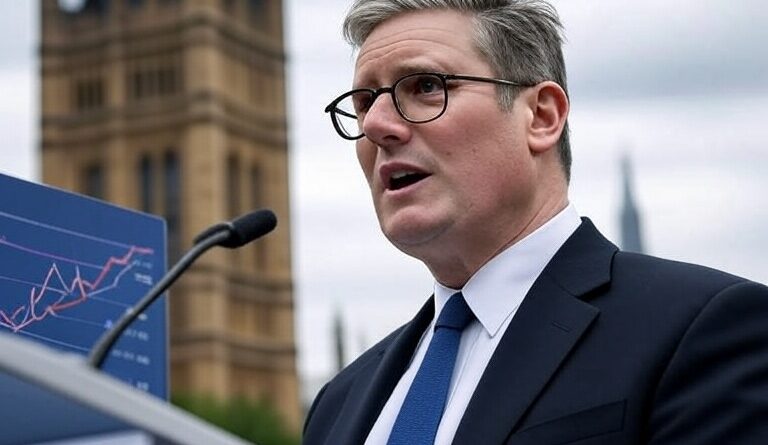Socialism’s Wealth Conundrum: Has It Ever Delivered Prosperity?
Tax Hikes Tank Markets, Markets Drive Wealth
n 2025, Britain faces a 10% energy bill surge (Ofgem) and taxes at a 75-year high (IFS), as Keir Starmer’s Labour government embraces socialist-leaning policies—rail nationalization, a £40 billion tax hike, and a £4.7 billion welfare boost. Jeremy Corbyn’s “Your Party” pushes for deeper state control, reviving Marxist dreams. But UK socialism in 2025 is strangling markets, not fostering prosperity, with tax hikes driving away investment and jobs. History—from Soviet stagnation to Venezuela’s collapse—and even Nordic successes show markets, not mandates, drive wealth. This analysis unpacks Labour’s direction, focusing on how Starmer’s tax hikes damage the UK economy in 2025, and why markets hold the key. Join the debate to shape Britain’s future.
Defining the Beast – What Is True Socialism?:
Socialism emphasizes state ownership and central planning over market-driven profits. Marx envisioned worker-controlled production; Lenin delivered bureaucracy. Labour’s 2025 agenda—nationalizing rail, hiking taxes to 45% for top earners, and boosting welfare—echoes socialist principles, while Corbyn demands full utility nationalization. The promise: equity. The reality: tax hikes are crushing UK markets, while history shows markets drive prosperity for the UK economy in 2025.
Socialism’s Historical Failures: Markets Outshine Mandates
Centralized socialist systems falter against market-driven economies:
- Soviet Union: Industrial gains (1920s-50s) stalled at 2% GDP growth (1960-1980), lagging the US’s 3.2% (World Bank). Markets fueled Western innovation; Soviet plans bred breadlines.
- China’s Great Leap Forward (1958-1961): State-driven goals caused 15-45 million deaths and economic ruin. Post-1978 market reforms, opening to private enterprise, lifted 800 million from poverty, with GDP growth hitting 10% by the 1990s (World Bank).
- Venezuela: GDP crashed 65% (2013-2021, IMF) as state-run oil fell from 3.5 to 0.7 million barrels/day (OPEC, 2020). Capitalist oil markets built its prior wealth.
- Poland Post-1989: Socialist stagnation (0.2% GDP growth, 1980s) gave way to market reforms, driving 5-6% growth in the 1990s (World Bank). Privatization and tax cuts unleashed prosperity.
The UK’s private rail sector, adding £5.7 billion to GDP in 2019 (Oxford Economics), proves markets’ edge over socialist mandates.
Nordic Model: Capitalist Wealth, Not Socialist Triumph
Labour touts Nordic countries—Denmark, Sweden, Norway—as socialist models, but their wealth stems from markets. Private sectors drive 70% of GDP (OECD, 2024). Norway’s $1.4 trillion oil fund comes from capitalist oil exports. Sweden’s private tech sector—Spotify and Ericsson contributed £10 billion to GDP in 2023 (Statista)—fuels growth, not welfare. Denmark’s Maersk shipping empire added £8 billion to GDP in 2023 (Statista). High taxes (35.9%-43.4% of GDP) fund safety nets but don’t create wealth—top 10% hold 65-69% of assets, worse than the UK’s 50-60% (Credit Suisse, 2014). Sweden’s 2007 wealth tax repeal boosted investment by 4% annually (OECD), a lesson for Labour’s tax hikes, which risk capital flight as 30% of UK millionaires consider emigration (LSE, 2021).
UK’s 2025 Direction: Tax Hikes Damage Markets
Labour’s 2025 policies test socialist ideas, but tax hikes are strangling markets:
- Rail Nationalization: Great British Railways (July 2025) aims to save £2.2 billion by cutting private profits (The Guardian). Yet, British Rail (1948-1997) drained 1-2% of GDP in subsidies, while privatization cut costs to 0.5-1% and raised on-time rates from 85% to 90% (Office of Rail and Road). Markets drove £5.7 billion in rail GDP (2019); taxpayers funded £1.5 billion in bailouts (2023, Department for Transport).
- Tax Hikes: Taxes hit a 75-year high (IFS, 2025), with a 45% top income tax rate, a proposed 2% wealth tax on £10m+ assets to raise £1.5 billion (The Guardian), and a 1.5% employer National Insurance hike adding £15 billion (OBR, 2025). These are crushing markets—FDI fell 5% in 2024 (ONS), and 4,500 farm businesses closed since Labour’s 2024 win (Defra). A 2021 LSE study warned 30% of millionaires may flee under wealth taxes, costing £10 billion in lost investment.
- Energy and Welfare: Windfall taxes on energy firms target 10% bill hikes (Ofgem, 2025) but risk £2 billion in lost green investment (CBI, 2025). Welfare hikes—£4.7 billion for child benefits and 50,000 social housing units (IFS, 2025)—fuel a £41.2 billion deficit (NIESR, 2025). Market-driven energy startups could cut costs without subsidies.
Markets drive UK prosperity—private firms innovate, while tax hikes stifle growth.
What’s at Stake for the UK in 2025?
Labour’s tax hikes threaten the UK economy in 2025. The £40 billion tax increase and £105.2 billion debt costs (OBR, 2025) erode business confidence, with FDI down 5% (ONS, 2024). Middle earners (£30,000-£50,000) face a 30% effective tax rate (IFS, 2025), cutting consumer spending by 2% (NIESR, 2025). Farm closures (4,500 since 2024) and a 3.6% inflation rate (June 2025, ONS) hit rural jobs. Energy taxes deter green tech, risking 10,000 jobs (CBI, 2025). Markets offer solutions: private rail’s £5.7 billion GDP and energy startups’ innovations show competition drives prosperity. A 2025 ScienceDirect study estimates planned economies lose 2% annual growth, a red flag for Labour’s path.
Verdict: Tax Hikes Torpedo Markets
Labour’s 2025 socialist gamble—rail grabs, £40 billion tax hikes, welfare splurges—is a market-killing disaster. Markets drive prosperity: UK rail’s £5.7 billion GDP, Nordic tech and oil billions, Poland’s post-socialist boom. Socialism’s Soviet wrecks, Venezuelan ruins, and Nordic tax traps prove state mandates fail. Starmer’s 75-year tax highs and £41.2 billion deficit choke investment—30% of millionaires may bolt, taking £10 billion. Why torch markets for a rusty ideology?
Conclusion: Markets Reign, Tax Hikes Ruin
UK socialism in 2025 is a market-murdering delusion. Soviet stagnation, Venezuela’s collapse, and Nordic wealth—built by markets, not mandates—expose the truth. Labour’s £40 billion tax hikes, £1.5 billion rail bailouts, and £41.2 billion deficits bleed Britain dry, crushing FDI and jobs. Markets deliver: private rail’s 90% punctuality, £5.7 billion GDP, Sweden’s tech boom. Starmer’s red revival is a corroded ideology fleecing the UK. Readers, will tax hikes hit your wallet or can markets save the day? Share below!
Starmer’s tax hikes tank markets—join the X debate! Follow Feniks Knows Best for raw truth, sign up for our newsletter, and share now! Poll: Do markets outperform Labour’s taxes? #UKSocialism2025
References
- The Guardian: Labour’s rail nationalisation
- The Guardian: Starmer’s tax rises
- The Guardian: Wealth tax proposals
- Institute for Fiscal Studies: Tax burden at 75-year high
- Office of Rail and Road: Rail performance
- Oxford Economics: Rail’s £5.7 billion GDP
- Department for Transport: £1.5 billion rail bailouts
- Ofgem: Energy bill hikes 2025
- CBI: Windfall taxes impact
- OECD: Nordic tax-to-GDP ratios
- Credit Suisse: Wealth inequality
- World Bank: GDP growth data
- IMF: Venezuela GDP decline
- OPEC: Venezuela oil output
- NIESR: £41.2 billion deficit
- ScienceDirect: Planned economies growth drag
- Statista: Sweden tech sector GDP
- ONS: FDI decline 2024
- LSE: Wealth tax emigration risks
- OBR: £40 billion tax increase, £105.2 billion debt costs
- Defra: Farm business closures

